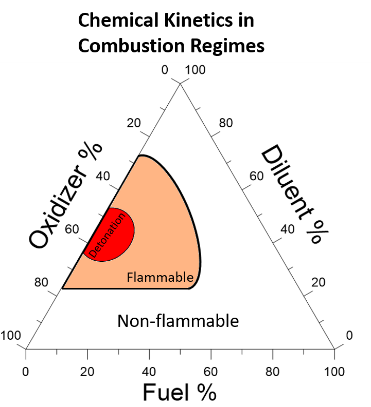Chemical Kinetics in Combustion

The chemistry of combustion is a fundamental discipline that shapes the design and optimization of combustion systems across diverse applications, from automotive engines to aerospace propulsion and energy production. Our research is dedicated to unraveling the complex kinetics of fuel decomposition and oxidation, which are essential for predicting and improving the efficiency and stability of combustion processes. By addressing key questions about these mechanisms, we contribute to the development of more efficient and reliable combustion technologies.
For instance, oxidation studies at ambient conditions help determine fuel storage longevity without compromising its fundamental properties. Meanwhile, studying oxidation at high temperatures (above 850 K) provides insights into combustion behavior, such as soot formation, thrust generation, and other critical factors.
We also focus on the control and prevention of undesired combustion in specific environments. By characterizing flame properties and identifying the conditions required to inhibit or extinguish flames, we enhance the safety and reliability of combustion technologies.
Representative Publications
-
Pyrolysis of ethanol studied in a new high-repetition-rate shock tube coupled to synchrotron-based double imaging photoelectron/photoion coincidence spectroscopy.S. Nagaraju, R.S. Tranter, F.E. Cano Ardila, S. Abid, P.T. Lynch, G.A. Garcia, J.F. Gil, L. Nahon, N. Chaumeix, A. Comandini.Combustion and Flame, 2021, 226, 53-68.
-
External standard calibration method for high-repetition-rate shock tube kinetic studies with synchrotron-based time-of-flight mass spectrometry.Fabian E. Cano Ardila, Sharath Nagaraju, Robert S. Tranter, Gustavo A. Garcia, Anthony Desclaux a, Anthony Roque Ccacya, Nabiha Chaumeix and Andrea Comandini.Analyst, 2024, 149, 1586-1596.

